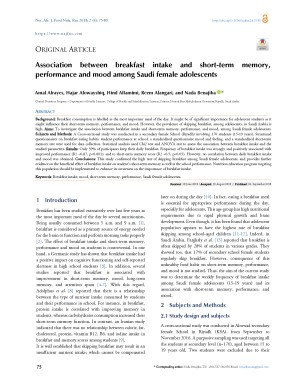Association between breakfast intake and short-term memory, performance and mood among Saudi female adolescents
Abstract
Background: Breakfast consumption is labelled as the most important meal of the day. It might be of significant importance for adolescent students as it might influence their short-term memory, performance and mood. However, the prevalence of skipping breakfast among adolescents in Saudi Arabia is high. Aims: To investigate the association between breakfast intake and short-term memory, performance and mood among Saudi female adolescents. Methods and Material: A Cross-sectional study was conducted in a secondary female School (Riyadh) involving 170 (15-19 years). Structured questionnaires on breakfast eating habits, student performance at school, a standardized questionnaire mood and feeling and a standardized short-term memory test. Statistical analysis used Chi2 test and ANOVA test to assess the association between breakfast intake and the studied parameter. Results: Only 39% of participants keep their daily breakfast. Frequency of breakfast intake was strongly and positively associated with improved performance (R2=0.87, p<0.001), and to short-term memory score (R2=0.5, p<0.05). However, no correlation between daily breakfast intake and mood was obtained. Conclusions: This study confirmed the high rate of skipping breakfast among Saudi female adolescents, and provides further evidence on the beneficial effect of breakfast intake on student’s short-term memory as well as the school performance. Nutrition education program targeting this population should be implemented to enhance its awareness on the importance of breakfast intake.
Full text article
Authors
Copyright (c) 2018 Authors

This work is licensed under a Creative Commons Attribution 4.0 International License.
-
Attribution — You must give appropriate credit, provide a link to the license, and indicate if changes were made. You may do so in any reasonable manner, but not in any way that suggests the licensor endorses you or your use.
-
No additional restrictions — You may not apply legal terms or technological measures that legally restrict others from doing anything the license permits.





